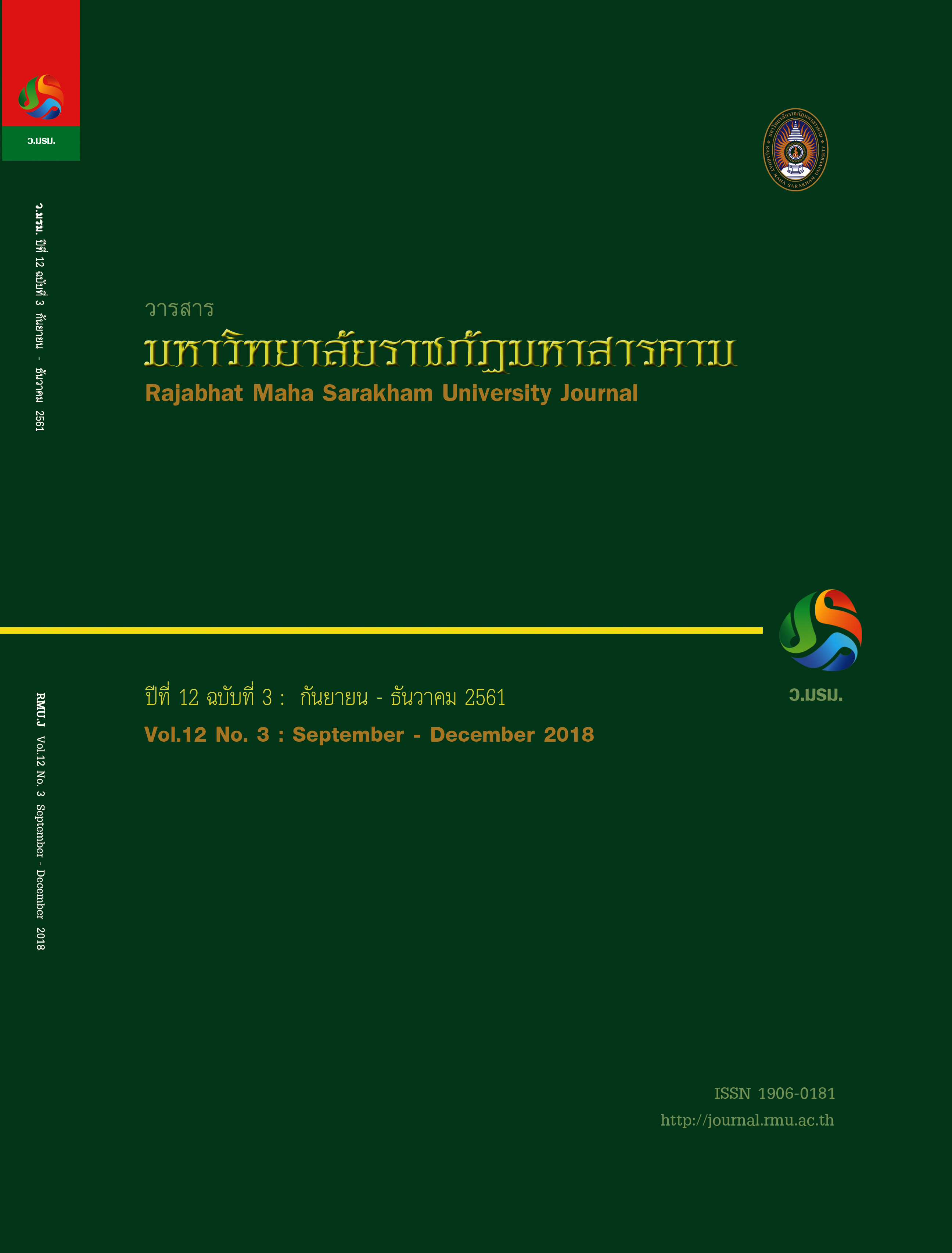การพัฒนารูปแบบการจัดการเรียนรู้โดยใช้การโต้แย้งเชิงวิทยาศาสตร์ในวิชาฟิสิกส์สำหรับนักเรียนชั้นมัธยมศึกษาปีที่ 4
Main Article Content
บทคัดย่อ
การวิจัยครั้งนี้มีวัตถุประสงค์เพื่อ 1) ศึกษาสภาพการจัดการเรียนรู้ในวิชาฟิสิกส์ 2) พัฒนารูปแบบการจัดการเรียนรู้โดยใช้การโต้แย้ง
เชิงวิทยาศาสตร์ในวิชาฟิสิกส์สำหรับนักเรียนชั้นมัธยมศึกษาปีที่ 4 กลุ่มตัวอย่างที่ใช้เป็นนักเรียนชั้นมัธยมศึกษาปีที่ 4 จำนวน 385 คน
ครู จำนวน 110 คน จากโรงเรียนสังกัดสำนักงานเขตพื้นที่การศึกษามัธยมศึกษาเขต 28 ไดม้ าโดยการสมุ่ แบบหลายขั้นตอนเครื่องมือที่ใช้
ในการเก็บรวบรวมข้อมูล 1) แบบสอบถามสภาพการจัดการเรียนรู้วิชาฟิสิกส์สำหรับครูผู้สอนวิชาฟิสิกส์ 2) แบบสอบถามสภาพ
การจัดการเรียนรู้ในวิชาฟิสิกส์สำหรับนักเรียนชั้นมัธยมศึกษาปีที่ 4 3) แบบประเมินความเหมาะสมของรูปแบบการจัดการเรียนรู้โดย
ใช้การโต้แย้งเชิงวิทยาศาสตร์ในวิชาฟิสิกส์สำหรับนักเรียนชั้นมัธยมศึกษาปีที่ 4 สถิติที่ใช้ในการวิเคราะห์ข้อมูลได้แก่ค่าเฉลี่ยและ
ส่วนเบี่ยงเบนมาตรฐานผลการวิจัยพบว่า
1. สภาพการจัดการเรียนรู้ในวิชาฟิสิกส์สำหรับนักเรียนชั้นมัธยมศึกษาปีที่ 4จากการวิจัยเชิงสำรวจกับตัวอย่างในการวิจัยทั้งสอง
กลุ่ม คือ ครูผู้สอนฟิสิกส์และตัวอย่างนักเรียนชั้นมัธยมศึกษาปีที่ 4อยู่ในระดับปานกลาง ค่าเฉลี่ยความคิดเห็นที่มีปัญหา คือ ด้านการ
จัดกิจกรรมการเรียนรู้ และรองลงมาคือด้านสื่อการเรียนรู้
2. รูปแบบการจัดการเรียนรู้โดยใช้การโต้แย้งเชิงวิทยาศาสตร์ในวิชาฟิสิกส์ประกอบด้วย 4 องค์ประกอบ ได้แก่ 1) แนวคิดทฤษฎี
พื้นฐานของรูปแบบการจัดการเรียนรู้ 2) วัตถุประสงค์ของรูปแบบการจัดการเรียนรู้ 3) กระบวนการเรียนการสอนของรูปแบบการจัดการ
เรียนรู้ ซึ่งประกอบด้วย 5 ขั้น คือ 1) ขั้นสร้างความสนใจ 2) ขั้นกำหนดประเด็นโต้แย้ง 3) ขั้นแสดงเหตุผลและหลักฐาน 4) ขั้นสร้าง
การโต้แย้งและ 5) ขั้นสะท้อนผล 4) การวัดและประเมินผลรูปแบบการจัดการเรียนรู้ ผลการประเมินความเหมาะสมของรูปแบบการ
จัดการเรียนรู้โดยใช้การโต้แย้งเชิงวิทยาศาสตร์ในวิชาฟิสิกส์สำหรับนักเรียนชั้นมัธยมศึกษาปีที่ 4มีความเหมาะสมในระดับมาก
Article Details
1. บทความที่ลงตีพิมพ์ทุกเรื่องได้รับการตรวจทางวิชาการโดยผู้ประเมินอิสระ ผู้ทรงคุณวุฒิ (Peer Review) สาขาที่เกี่ยวข้อง อย่างน้อย 3 ท่าน ในรูปแบบ Double blind review
2. ข้อคิดเห็นใด ๆ ของบทความที่ลงตีพิมพ์ในวารสารมหาวิทยาลัยราชภัฏมหาสารคาม นี้เป็นของผู้เขียน คณะผู้จัดทำวารสารไม่จำเป็นต้องเห็นด้วย
3. กองบรรณาธิการวารสารมหาวิทยาลัยราชภัฏมหาสารคาม ไม่สงวนสิทธิ์การคัดลอกแต่ให้อ้างอิงแสดงที่มา
เอกสารอ้างอิง
Curriculum 2008 : The Content and Standards of
Science Learning. Bangkok : Organization of
Transfer Products and Packging.
[2] National Institute of Educational Testing Service
(Public Organization). (2018). O-NET Exam Results.
may 30,2018web site:http://www.niets.or.th/th/
catalog/view/2989
[3] Institute for the Promotion of Teaching Science and
Technology.(2015). Summary of PISA 2015 Results.
may 30,2018 web site :http://pisathailand.ipst.
ac.th/pisa/reports/pisa2015summaryreport
[4] Institute for the Promotion of Teaching Science and
Technology.(2018). Teaching physics Let the
students know. may 30,2018 web site :http://
physics.ipst.ac.th/?p=3731
[5] Osborne, Jonathan.(2007). Science Education for the
Twenty First Century. Eurasia Journal of
Mathematics, Science & Technology Education.
3(3),173-184.
[6] Dawson,Vaille Maree; & Venville, Grady.(2010).
Teaching Strategies for Developing Students’
Argumentation Skills About Socioscientific Issues
in High School Genetics. Res Sci Educ, 40,133-148.
[7] Simon, Shirley. (2011). Argumentation. In How
Science Works : Exploring Effective Pedagogy
and Practice. Edited by Toplis, Rob. New York,
USA : Routledge.
[8] Sampson, Victor; Grooms, Jonathon ; & Walker, Joi
Phelps. (2010). Argument-Drive Inquiry as a Way
to Help Students Learn How to Participate in
Scientific Argumentation and Craft Written
Arguments : An Exploratory Study. Science
Education, 95, 217-257.
[9] Evagorou, Maria; & Osborne, Jonathan. (2013).
Exploring Young Students’ Collaborative
Argumentation with in a Socioscientific Issue.
Journal of Research in Science Teaching, 50(2),
209-237.
[10] Llewellyn,Douglas; & Rajesh, Hema. (2011).
Fostering Argumentation Skills: Doing What Real
Scientists Really Do. Science Scope, 35(1), 22-28.
[11] Somsuk, Prapa. (2015). Development of the 2I3C
PhysicsInstructionalModel Using Scientific
Argumentationfor Upper Secondary School
Students, .Doctor of Education Thesis. Bangkok :
Srinakharinwirot University.
[12] Chantraukrit,Pornthep. (2013). Development of
an Instructional Model by Integrating the
Argument-Driven Inquiry Model and Model-Based
Learning Approach to Promote Scientific Literacy
Competencies and Rationality of Lower Secondary
School Students. Doctor of Education Thesis.
Bangkok : Chulalongkorn University.
[13] Khemmani, Tisana. (2010). Teaching Science.
Chulalongkorn University, Bangkok.
[14] Joyce,B., and Weil, M.(1992). Models of teaching.
Needham Heights, MA Allyn and Bacon.
[15]Arends.(1997). Classroom Instruction and
Management. New York : McGraw-Hill.
[16] Anderson. (2003). Teaching Science as Inquiry.
Indiana : Indiana University.
[17] Juntasen,Chunchai. (2015). The Development of
Science Learning Model for Promotion High
School Students’ Critical Thinking. Doctorof
Education Thesis. Mahasarakham : Mahasarakham
University.


